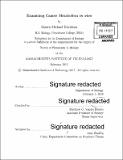Examining cancer metabolism in vivo
Author(s)
Davidson, Shawn Michael
DownloadFull printable version (27.69Mb)
Other Contributors
Massachusetts Institute of Technology. Department of Biology.
Advisor
Matthew G. Vander Heiden.
Terms of use
Metadata
Show full item recordAbstract
Nutrient requirements for cancer cells are different from those of most normal cells. Understanding these differences, and the factors that are responsible for creating different metabolic dependencies, is critical to understanding the basic requirements of rapid proliferation and identifying potential therapeutic vulnerabilities. In particular, oncogene status, tissue-of-origin, cell-of-origin, and microenvironmental factors all can contribute to defining these requirements, but how to characterize which dependencies exist in various physiological setting are unknown. In this thesis, we address key challenges to study cancer metabolism in the living organism. We present novel experimental and analytical methods to study tumor metabolism in mouse models. This includes: (1) an approach to determine the metabolic fate of any radioactive or stable-isotope tracer in tumors and tissues (2) strategies to create stable-isotope macromolecular (protein) tracers (3) a plasmapheresis strategy to deliver labeled protein in vivo (4) qualitative and quantitative methods to define kinetics of extracellular protein catabolism in live tumors in real-time (5) the characterization of a conditional allele to test the requirements for isoform-specific pyruvate kinase expression. We applied these methods to three mouse models of cancer (models of human lung, pancreas, and prostate cancer) to better characterize metabolism and identify potential metabolic vulnerabilities in these tumors. Our results show that tumors in vivo utilize a metabolic program that is distinct from cells in tissue culture derived from those same tumors. Additionally, we identified that the uptake and subsequent catabolism of extracellular protein provides a substantial proportion of free intracellular amino acids for pancreatic cancer cells in tumors. Finally, we have identified prostate cancer as a tumor type that may benefit from pharmacological activation of pyruvate kinase. Overall, our results demonstrate the importance of studying cancer metabolism in the correct physiological setting. Data generated from patients corroborates our findings in these mouse models and suggests that these approaches can be used to define more effective cancer therapeutic strategies. The methods presented here are adaptable to study the metabolic phenotypes in any tumor or tissue of interest. Further use of these methods enable the examination of cell autonomous and non-cell autonomous metabolic consequences of oncogene status, microenvironment, and in organismal metabolism as a function of cancer initiation and progression.
Description
Thesis: Ph. D., Massachusetts Institute of Technology, Department of Biology, 2017. Cataloged from PDF version of thesis. Includes bibliographical references.
Date issued
2017Department
Massachusetts Institute of Technology. Department of BiologyPublisher
Massachusetts Institute of Technology
Keywords
Biology.